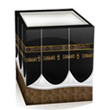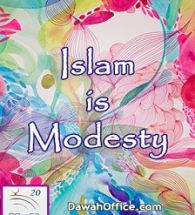The Ruling on a Menstruating Woman Reading Supplications
- Details
- Category: Sheikh Bin Baz
- Published on Thursday, 07 November 2013 11:00
- Hits: 1066
The Ruling on a Menstruating Woman Reading Supplications
Question:
Is it permissible for a menstruating woman to read a book of supplications on the Day of 'Arafah, in spite of the fact that there are Qur'anic Ayaat in it?
Answer:
There is no sin in a menstruating woman or a woman with post-natal bleeding reading the prescribed supplications during the rites of Hajj, nor is there any objection to her reciting from the Qur'an, according to the most correct view, because there is no clear, authentic evidence forbidding the menstruating woman or the woman with post-natal bleeding from reciting the Qur'an.
It has only been reported concerning the one who is Junub that they should not read the Qur'an when Junub, based upon the Hadith of 'Ali, may Allah be pleased with him.
As for the menstruating woman and the one who has post-natal bleeding, it has been reported concerning them on the authority of Ibn 'Umar, may Allah be pleased with him: "The menstruating woman and the one who is Junub should not read the Qur'an." [At-Tirmithi no.131 and Ibn Majah 595, 596.] -but it is weak, because it is a narration of Isma'il bin 'Ayyash from the people of the Hijaz,and he is weak when he reports from them.
But it must be recited without touching the Book, from memory. As for the one who is Junub, it is not permissible for him to recite the Qur'an - neither from memory nor from the book, until he makes Ghusl.
The difference between them is that the time during which he remains impure is short, and he is able to perform Ghusl immediately after having sex with his wife, therefore its duration is not long, and the matter is up to him - whenever he wishes to perform Ghusl, he may do so, or if he is unable to find water, he may perform Tayammum and pray and recite the Qur'an.
As for the menstruating woman or the one who has post-natal bleeding, the matter is not up to them - it is only in the Hands of Allaah the Almighty, the All-Powerful... and menstruation and postpartum bleeding require days before they finish. This is why it has been permitted for them to recite the Qur'an, so that they do not forget it, and so that they do not lose the virtue of recitation and the study of legal rulings from the book of Allah.
Therefore it is more natural that she be allowed to read books which contain supplications that include Qur'anic Ayaat and Hadiths and so on. This is the correct view and it is the most authoritative of two opinions held by the scholars - may Allah have mercy on them - in this matter.
Shaykh `Abdul-`Azeez Bin Baz
Fatawa Islamiyah, vol.2, p110-112, DARUSSALAM.





















